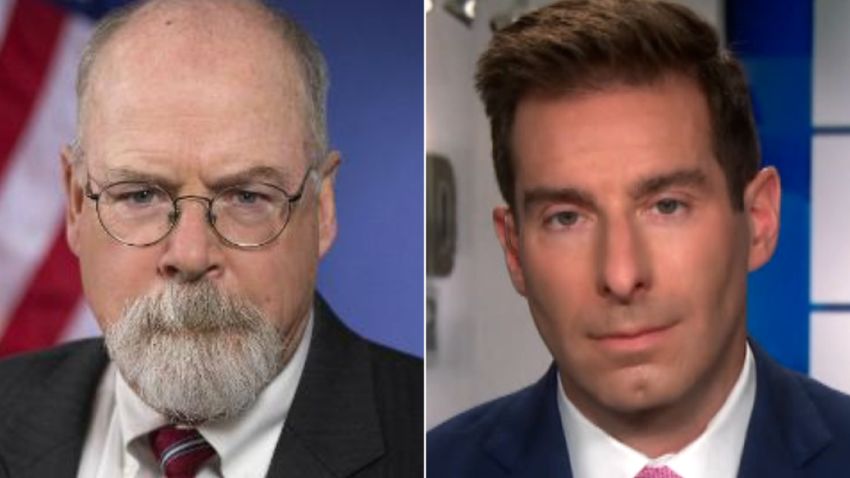Special counsel John Durham released his final report on Monday in which he casts doubt about the FBI’s decision to launch a full investigation into connections between Donald Trump’s campaign and Russia during the 2016 election.
The 300-plus page report sharply criticizes the FBI and Justice Department throughout but does not recommend any new charges against individuals or any “wholesale changes” to the way politically sensitive investigations are handled.
The report does not ultimately fulfill the expectations set by former President Trump and his allies who have long claimed that it would prove the FBI’s investigation was nothing more than a political witch hunt.
Here are takeaways from the special counsel’s report:
Durham finds FBI rushed to investigate Trump
The special counsel’s office “conducted more than 480 interviews,” and “obtained and reviewed more than one million documents consisting of more than six million pages,” while also issuing 190 grand jury subpoenas, according to the report.
The Durham report, however, relies on many public findings – including problems with the investigation that were detailed in a 2019 investigation by DOJ Inspector General Michael Horowitz – to question the bureau’s decision to open a full investigation, one the watchdog found to be legal and unbiased.
And while Durham acknowledges the FBI did have reason to open a preliminary review or investigation, he accuses the bureau of failing to uphold its “important mission of strict fidelity to the law in connection with certain events and activities described in this report.”
A preliminary investigation requires a lower threshold to open than a full investigation, and for that reason also means the agents can’t use more invasive tools like FISA surveillance warrants.
Claims FBI had no real evidence of collusion before launching probe
Durham concluded that federal investigators did not have “any actual evidence of collusion” between Trump’s 2016 campaign and Russia before launching a yearslong probe into the matter.
That finding was at the core of Durham’s most scathing criticism of the FBI’s decision to launch a full investigation.
“Indeed, based on the evidence gathered in the multiple exhaustive and costly federal investigations of these matters, including the instant investigation, neither U.S. law enforcement nor the Intelligence Community appears to have possessed any actual evidence of collusion in their holdings at the commencement of the Crossfire Hurricane investigation,” the report states.
Durham knocked the FBI for failing to take several steps before launching the Trump campaign investigations, such as interviewing relevant witnesses, reviewing its own intelligence databases or using “any of the standard analytical tools typically employed by the FBI in evaluating raw intelligence.”
He suggested that if the FBI had taken those steps, it would have found that US intelligence agencies did not have any evidence tying Trump to Russian leadership officials.
Claims of FBI personnel bias
The report concludes that “at least on the part of certain personnel intimately involved in the matter” there was “a predisposition to open an investigation into Trump.”
Durham mentions former FBI Deputy Director and CNN senior law enforcement analyst Andrew McCabe and zeros in on Peter Strzok, the ex-deputy director of the counter-intelligence division.
“Strzok, at a minimum, had pronounced hostile feelings toward Trump,” Durham wrote, while quoting in a footnote previously known texts between Strzok and Lisa Page, then an FBI attorney.
In his 2019 report, Horowitz specifically said Strzok and Page did not affect the start of the investigation or didn’t act out of political bias.
While Durham sharply criticizes the FBI’s behavior, his report also does not recommend bringing any new charges against law enforcement officials or “wholesale changes” to bureau guidelines and policy.
Durham claims FBI had different standards for Trump and Clinton
Durham’s report also states that the FBI used “raw, unanalyzed, and uncorroborated intelligence,” to launch the “Crossfire Hurricane” investigation into Trump and Russia but used a different standard when weighing concerns about alleged election interference regarding Hillary Clinton’s campaign.
He points specifically to “highly significant intelligence” the FBI “received from a trusted foreign source pointing to a Clinton campaign plan to vilify Trump by tying him to Vladimir Putin so as to divert attention from her own concerns relating to her use of a private email server.”
“Unlike the FBI’s opening of a full investigation of unknown members of the Trump campaign based on raw, uncorroborated information, in this separate matter involving a purported Clinton campaign plan, the FBI never opened any type of inquiry, issued any taskings, employed any analytical personnel, or produced any analytical products in connection with the information,” the report said.
Durham notes that the FBI did not open an investigation into a purported plan by foreign operatives to target the Clinton campaign but rather took other steps in response to those concerns, which included providing defensive briefings for the then-Democratic presidential nominee and her staff.
FBI failed to corroborate Steele dossier allegations
The report is critical of the Steele dossier, the explosive document that had been used by the FBI to bolster its case for probable cause to secure surveillance warrants against a former Trump campaign adviser.
The Steele dossier contained unverified allegations about Trump’s connections to Russia, including his alleged business dealings, rumors of lurid trysts in Moscow and claims that his campaign collaborated with the Kremlin in 2016.
Crossfire Hurricane investigation “did not and could not corroborate any of the substantive allegations” contained in the controversial Steele dossier, which was used by the FBI to obtain a FISA warrant, Durham found.
“As noted, it was not until mid-September that the Crossfire Hurricane investigators received several of the Steele Reports. Within days of their receipt, the unvetted and unverified Steele Reports were used to support probable cause in the FBI’s FISA applications targeting (Carter) Page, a U.S. citizen who, for a period of time, had been an advisor to Trump,” the report says.
“As discussed later in the report, this was done at a time when the FBI knew that the same information Steele had provided to the FBI had also been fed to the media and others in Washington, D.C.,” it adds.
Witness testimony exposed the FBI’s overreliance on the dossier as it sought court approval to wiretap a former Trump campaign adviser in 2016. Other FBI officials described rookie mistakes that undercut the bureau’s brief inquiry into a possible Trump-Russia internet backchannel. At closing arguments during one of last year’s trials, Durham told jurors that “the FBI failed” on many occasions.
What’s next
Durham’s conclusions condemning the FBI’s investigation into Trump is sure to fuel the debate about Russia, Trump, the FBI and the 2016 presidential election that is still swirling more than six years after and as Trump is campaigning once again for the White House.
House Judiciary Chairman Jim Jordan announced that he has reached out to the Department of Justice to have Durham testify next week – a clear sign that Trump’s Republican allies will seek to use the report to advance their own political objectives.
Trump himself has already seized on the report’s release, sending one fundraising email Monday with a subject line that read: “I WAS FRAMED.”



















